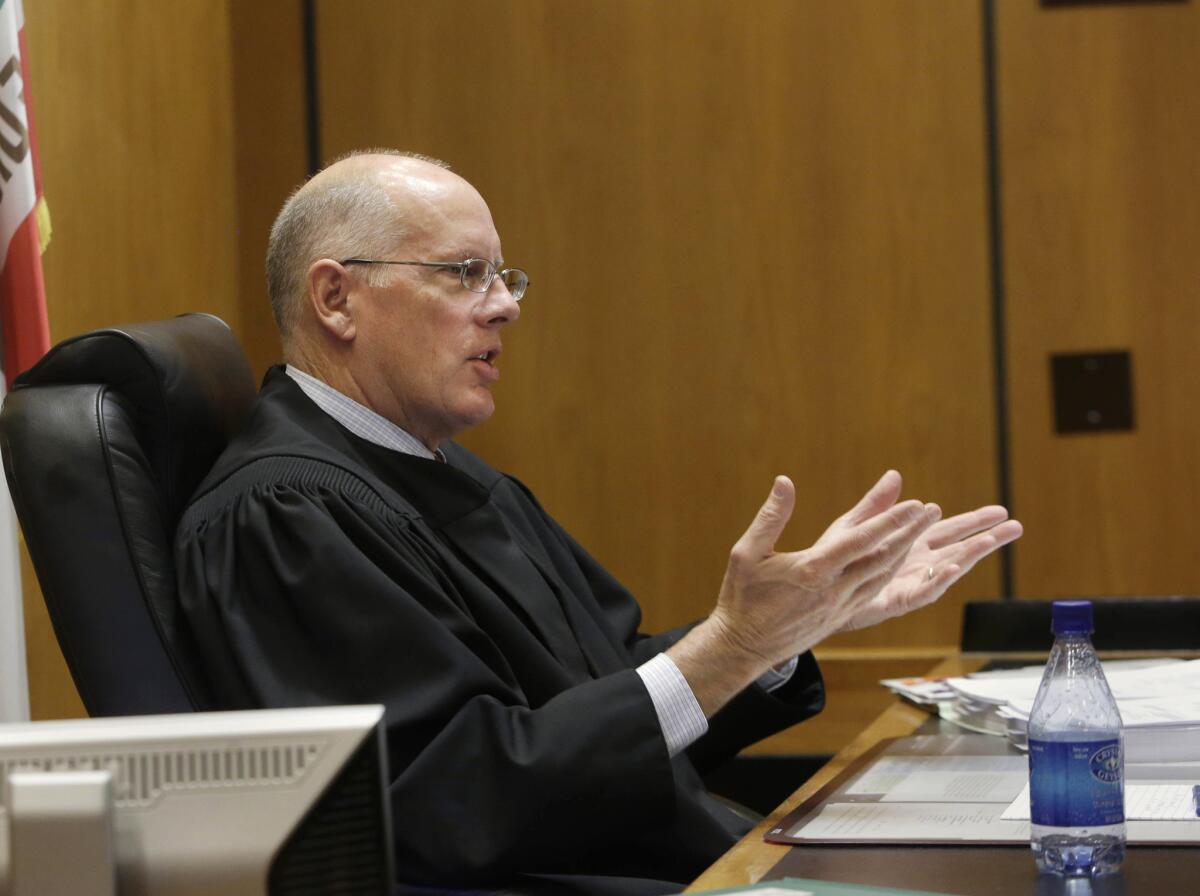Sacramento judge’s ruling throws bullet train’s future in doubt

- Share via
In a major legal blow to the California bullet train, a Sacramento judge ruled that state officials cannot pursue their plan to tap billions of dollars in voter-approved bond funding for construction, a decision that could cause indefinite delays in the massive $68-billion project.
Superior Court Judge Michael Kenny, ruling Monday in two closely watched cases, found the state officials made key errors and failed to comply with legal requirements as they moved the project toward a long-awaited groundbreaking.
The decisions don’t immediately halt the project, but they have thrown its future into doubt and could sharply curtail the state’s ability to fund a complete high-speed rail system. State officials said they were assessing their options and exploring ways to keep the project moving ahead.
Kenny ruled that the project’s funding plan violates state law and, separately, that the state cannot sell bullet-train bonds because officials failed to follow correct procedures.
Construction of the Los Angeles-to-San Francisco train, more than a year behind schedule, was most recently slated to begin in the second quarter of 2014.
The state still could start construction, possibly using federal money, though Kenny’s rulings mean that for the immediate future officials won’t have access to nearly $9 billion in high-speed rail bonds authorized by voters in 2008.
“The state should step back from this project and realize it made some bad political decisions,” said Stuart Flashman, an attorney representing Kings County and two of its residents in the case against the state rail agency. “Maybe we are not building the right high-speed rail project. If you were the captain of the Titanic, would you order full speed ahead after hitting an iceberg?”
Kenny ruled in the summer that the state had failed to comply with the requirements of Proposition 1A, the voter-approved measure that authorized borrowing to pay for the project’s initial phases.
The measure included provisions intended to ensure the state did not start the project if it did not have all of the funds needed to complete a fully operational and self-supporting first section of the line. But the state is $25 billion short of the funds needed to complete an initial working segment.
Kenny handed down his remedy, ruling that the state High Speed Rail Authority must rescind a 2011 funding plan and create a new one, a difficult task because officials haven’t been able to identify sources of additional revenue needed to complete the first phase.
Kenny did not grant a request to halt the project or major construction contracts issued this year to Tutor Perini Corp., a construction firm, and the California Department of Transportation.
The state has argued it can use federal funds that aren’t subject to the conditions of Proposition 1A to begin building the system. But eventually the state would have to match federal grant funds. Without access to bonds, the Legislature would have to appropriate money from a different source.
The rail authority board’s president, Dan Richard, said his agency would “chart our next steps” and stressed that Kenny did not grant critics’ request to immediately stop the project. “Like all transformative projects,” he said, “we understand that there will be many challenges that will be addressed as we go forward in building the nation’s first high-speed rail system.”
Bullet train opponents said Kenny’s ruling highlighted the project’s flawed management.
The state rail agency “has failed at every turn to detail a realistic plan that will fund this program,” said Rep. Kevin McCarthy (R-Bakersfield), a leader in the GOP-controlled House of Representatives. “With no private funds, unreliable ridership numbers and the reliance on taxpayers to eventually bail the project out — it should not move forward. My colleagues and I will continue our efforts to deny any federal funds going toward this unworkable boondoggle in the future.”
Monday’s ruling “could be a fatal stumbling block that the state can never satisfy,” said Michael Brady, a Bay Area attorney who represented the parties in the challenges ruled on by Kenny.
The judge Monday also rejected the rail agency’s request for formal validation of the proposed bullet-train bonds. Kenny said the state bypassed a fairly routine requirement that it consider evidence the bond sale is “necessary and desirable.”
State Treasurer Bill Lockyer’s office said Monday the state can’t sell bullet-train bonds without such a validation.
If the state chooses to start construction using only federal funds, it could be taking on a large financial risk. Initial construction of 29 miles in the Fresno area would cost an estimated $2 billion to complete. About $1 billion would go to contractor Tutor Perini. It is not clear how the state can finish even that limited portion of the project with only federal funding.
Rod Diridon, a former rail agency board member and longtime proponent of the project, discounted the significance of the ruling. “Our state is no longer used to mega projects,” he said. “There are going to be a lot of impediments. So suck it up.”
But Elizabeth Alexis, a co-founder of a Bay Area group that has been fighting the project, said Kenny’s decision sets up a major roadblock to the bullet train. The rail authority has been “acting as if it is above the law,” she said.
A second phase of the case brought by Kings County officials and two residents could take several more months to resolve. It will hinge on whether the state can comply with another Proposition 1A requirement — that the bullet train operate without a subsidy.
More to Read
Sign up for Essential California
The most important California stories and recommendations in your inbox every morning.
You may occasionally receive promotional content from the Los Angeles Times.











